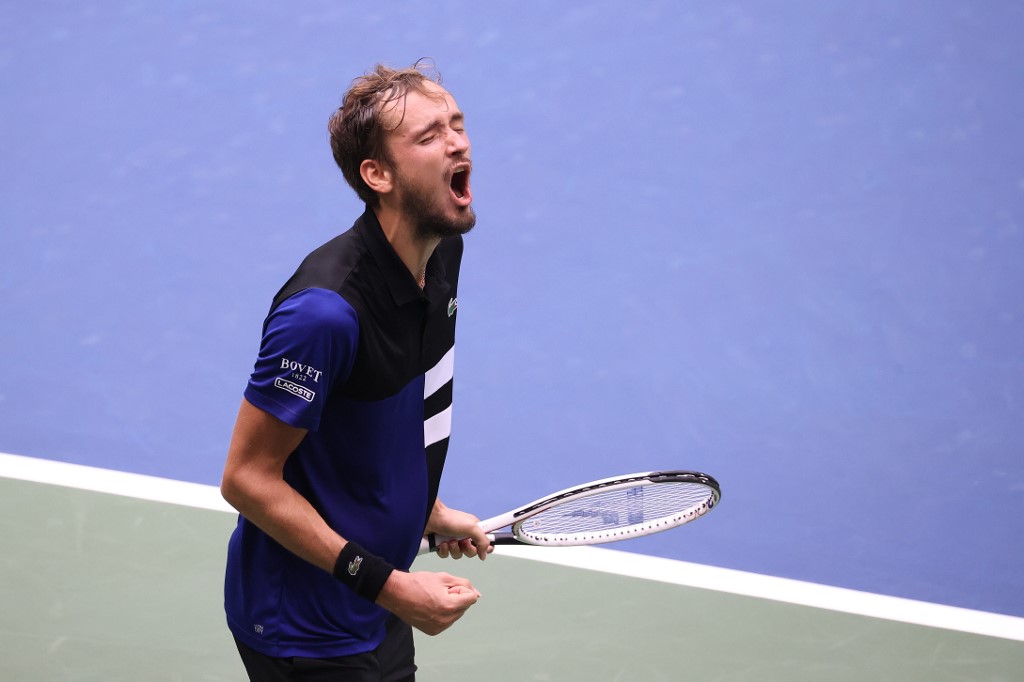
Daniil Medvedev of Russia celebrates winning match point during his Men’s Singles quarterfinal match against Andrey Rublev of Russia on Day Ten of the 2020 US Open at the USTA Billie Jean King National Tennis Center on September 9, 2020. Al Bello/Getty Images/AFP
NEW YORK— Not only had 2019 runner-up Daniil Medvedev not dropped a set in this U.S. Open entering his all-Russian quarterfinal against long-time pal Andrey Rublev, but Medvedev hadn’t allowed more than four games in any set.
So when Rublev grabbed a sizable lead in the opening-set tiebreaker Wednesday and three times was a single point from closing it, the moment felt momentous. Turned out it was.
The No. 3-seeded Medvedev fought off that trio of chances for No. 10 Rublev in the tiebreaker by reeling off five points in a row, and was on his way to a 7-6 (6), 6-3, 7-6 (5) victory to return to the semifinals at Flushing Meadows.
The only concern for Medvedev in the latter stages was whether his body would hold up — he was dealing with cramps and needed his right shoulder massaged by a trainer in the third set — but he did, indeed, hold on.
“It was tough at the end,” Medvedev said. “I felt like I could get in trouble.”
He took 51 of 57 points when his first serve went in, never faced a break point and wound up with a 51-23 edge in total winners.
In all, through five matches, Medvedev has won 65 of his 68 service games, saving 6 of 9 break points.
It’s been 60 years since a man won this Grand Slam tournament without ceding a set; Neale Fraser did so in 1960 at the event then known as the U.S. Championships.
A year after losing to Rafael Nadal in a five-set U.S. Open final that lasted nearly five hours, Medvedev heads to his second career major semifinal.
He will face either No. 2 seed Dominic Thiem or No. 21 Alex de Minaur, whose quarterfinal was scheduled for later Wednesday.
The other semifinal on Friday will be No. 5 Alexander Zverev vs. No. 20 Pablo Carreño Busta, who won quarterfinals Tuesday.
None of the remaining men has won a Grand Slam title.
Medvedev vs. Rublev pivoted in that first-set tiebreaker, which Rublev led 5-1, then 6-3. But Rublev started losing points and then his cool, slamming his racket down during the change of ends at 6-all. Medvedev’s five-point, set-clinching run culminated with a 128 mph ace.
In the second set, Rublev leaned over and screamed and was given a warning for an audible obscenity, although he told chair umpire James Keothavong that he didn’t curse.
At the changeover, Rublev told Keothavong, “You understand, beecause of your mistake, now they give me a fine?”
TOWEL TIMING
Count Serena Williams among the players who have complained about the amount of time chair umpires are giving players between points.
Among the changes at this pandemic-era U.S. Open is that players are responsible for getting their own towels, instead of getting them from, and handing them to, ball people. Williams — like Novak Djokovic, before he was disqualified, and others — say that chews up more seconds on the serve clock.
“We need to do a little work on that, because I feel like it’s not enough time. I feel like sometimes I’m really, like, sprinting to get my towel and that’s not really taken into consideration,” Williams said Wednesday after her three-set victory in the quarterfinals.
“And then, sometimes,” Williams continued, “I literally am looking at the towel, and I am like, ‘All right, I’m just not going to get it, because I simply don’t have time and I’m drenched,’ especially on a humid day like today.”
GREAT EXPECTATIONS
Tsvetana Pironkova’s first tournament in more than three years ended in a Grand Slam quarterfinal against Serena Williams. Not too shabby. Still, the 32-year-old Bulgarian does not want to set the bar too high for herself moving forward.
“’Expectations’” — yeah, that is a special word that I don’t really like. So I guess there will be more expectations after this tournament, for sure, but whether I put them on myself or not? I think I will not,” said the 32-year-old Bulgarian, who left the tour after Wimbledon in 2017 and became a mother. “I will try not to, because I know for sure that’s what helped me here … (playing) carefree. Going to try to keep it that way, I hope.”
She was planning a comeback in March until the coronavirus pandemic put a halt to sanctioned tennis for more than five months.